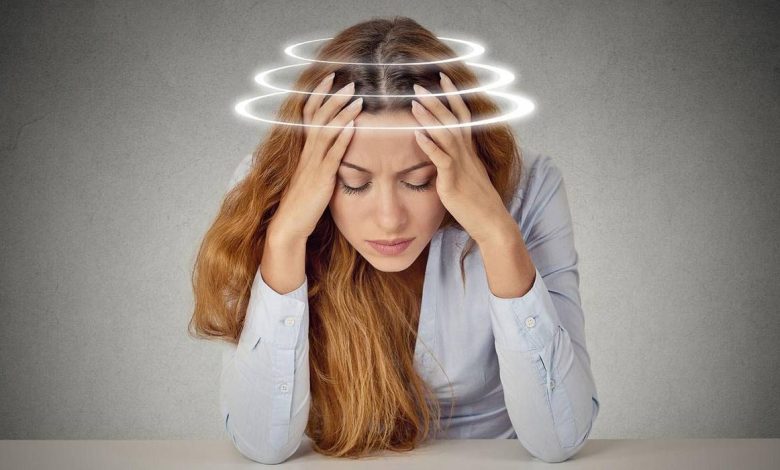Dizziness, disequilibrium: what is this, causes, symptoms, diagnostics, treatment, prevention

Dizziness; Lightheadedness – dizzy; Loss of balance; Vertigo
What is vertigo?
Dizziness – the feeling of rotation or whirling, when you are not moving. It can also be felt as a movement, when the body is stationary. Dizziness – sign, which may be caused by many diseases. Dizziness should be distinguished from mere fleeting dizziness or faintness short.
Causes of dizziness
The nerves and structures of the inner ear determine the position of the head and body in space. Vertigo is often caused by problems with the inner ear. Rarely vertigo occurs due to problems in the brain.
Vertigo can be classified into the following types:
Dizziness peripheral origin
Dizziness peripheral origin caused by problems of the inner ear. This is the most common type of vertigo. Causes may include:
- Benign paroxysmal positional vertigo (DPPG);
- Meniere's Disease;
- Perilymphatic fistula – channel or abnormal structure of the inner ear;
- Admission ototoxic drugs – Some medications may impair the ability of the inner ear sense and maintain the balance of body;
- Infection;
- Acoustic neuroma – a benign tumor of the inner ear;
- Decreased blood flow;
- Trauma;
- Otosclerosis – bony tissue build-up near the middle ear;
Vertigo of central origin
Vertigo of central origin occurs less frequently, as dizziness peripheral origin, but it is a more serious disorder. This type of vertigo associated with a malfunction of the brain stem or cerebellum, areas of the brain, that controls balance. Among the reasons for this type of vertigo can be :
- Brain lesions or tumors;
- Stroke;
- Migraine – headache;
- Nervous System Disorders, such as Parkinson's disease, multiple sclerosis;
- Epilepsy;
- Excessive exposure to alcohol, heavy metals or toxins;
- Trauma.
Risk Factors dizziness
Dizziness is a symptom, which may be caused by many diseases. The presence of any disease increases the risk of dizziness.
Symptoms of vertigo
Common symptoms include dizziness:
- The sense of rotation;
- The illusion of movement;
- The feeling of movement in one direction;
- Imbalance.
Vertigo is characterized by nausea. If there is no feeling of faintness movement. People often feel dizzy before fainting.
Diagnosis of vertigo
The doctor will ask about your symptoms and medical history, and perform a physical examination. To find the cause of vertigo, your doctor may conduct some tests:
- Dix-Hallpike maneuver (Dix-Hallpike) – movement of the head to stimulate the symptoms of dizziness;
- Hearing Tests;
- Measurement of blood pressure with the patient lying down and standing up;
- Elektronistagmogramma – Test to check for nystagmus, abnormal, rytmychnoho, twitching eye movements;
- MRT;
- Rotational test on a special chair;
- Auditory brainstem evoked potentials – for nerve conduction studies and auditory nerves brainstem.
Treatment of vertigo
Dizziness is a symptom of another disease. Treatment will focus on treatment of the underlying disease. Some efforts may also be directed to reduce the symptoms of dizziness:
Drugs for dizziness
- Antihistamines;
- Benzodiazepines;
- Antixolinergiki;
- Anti-nausea medication.
Lifestyle changes to for dizziness
Living with vertigo can be daunting, but not impossible. Use the following tips:
If you are in a crowded, open space or in public places :
- Use a cane, to improve balance and mobility;
- Take a seat at the far end of the playground or theater, to avoid unnecessary head movements;
- Try, Nearby was a place to, where you can sit down in the event of dizziness;
- Plot movements so, not to fall into place in the crowded rush hours.
Other tips:
- Do not read and do not work on your computer, If you are moving;
- Do not fly airplanes, if you have problems with the sinuses or hearing problems due to infection;
- Avoid loud background music and heavily lit areas;
- Try to eat smaller meals throughout the day;
- Drink plenty of fluids;
- Avoid tobacco, alcohol and caffeine.
Prevention of dizziness
Currently there is no way to prevent beforehand dizziness.
Used sources and literature
Block RW, Jen JC. Hearing and equilibrium. In: Goldman L, Schafer AI, eds. Goldman-Cecil Medicine. 26th ed. Philadelphia, PA: Elsevier; 2020:chap 428.
Chang Ak. Dizziness and vertigo. In: Walls RM, Hockberger RS, Gausche-Hill M, eds. Rosen’s Emergency Medicine: Concepts and Clinical Practice. 9th ed. Philadelphia, PA: Elsevier; 2018:chap 16.
Muncie HL, Sirmans SM, James and. Dizziness: approach to evaluation and management. Am Fam Physician. 2017;95(3):154-162. PMID: 28145669 pubmed.ncbi.nlm.nih.gov/28145669/.
